Taipei native Jim Sung (宋慶文) got his start in the craft beer industry the way many other brewers in Taiwan did — by home brewing. He worked a couple of desk jobs in Taipei after returning from college in California and started home brewing as a hobby on the weekends. His mother was concerned that he wasn’t out with his friends.
But as the 28-year-old tells me, “I was hanging out with my best friends, the yeast.”
Sung’s hobby has paid off. Opened in September of last year, Jim & Dad’s Brewing Company in Yilan County’s Yuanshan Township (員山) is a homely, two-story structure with floor-to-ceiling windows and a small lookout tower. At the back is a patio for outdoor tasting and a grassy area for children to run around — Sung even has a collection of toys for kids to play with while their parents drink.
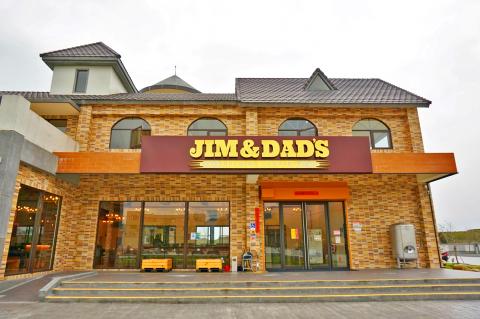
Photo: Dana Ter, Taipei Times
The first floor tasting area boasts red brick walls and wooden tables, chairs and floors, as well as windows for patrons to take a peek at the various tanks that are used to brew the beers. On display near the bar with 12 taps is Sung’s home brewing equipment — a reminder of his humble beginnings.
When I visit, the air is crisp and chilly. Jim & Dad’s is surrounded by an endless mountain range and rows of rice fields. Kavalan Distillery, which won the award for the world’s best single malt whiskey last year, is a stone’s throw away. Next to the brewery is a pristine river that leads to a hiking trail and waterfall.
Sung says that Yuanshan Township has been dubbed Taiwan’s “hometown of water” (水的故鄉) because it has the freshest water in the country.
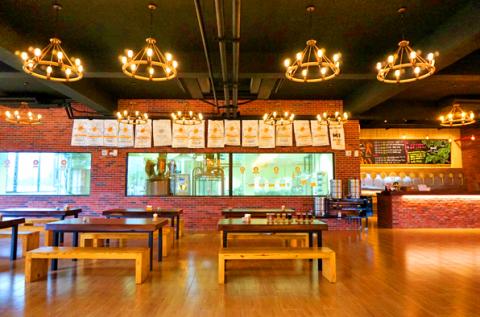
Photo: Dana Ter, Taipei Times
If it weren’t for the mountain of gravel just across the street, I never would have guessed that the land the brewery sits on used to be a gravel plant more than 20 years ago. It was abandoned for years and the layers of cement beneath the ground made it ill-suited for farming — though it was the perfect site for a brewery.
LOCAL BREWERY, GLOBAL OUTLOOK
When the government legalized private breweries in the early 2000s, a handful of home brewers jumped on board. After a few years, the industry tanked. Hengchun 3000, located in the south, closed down but recently re-opened and Le Ble d’Or and Jolly’s had to open restaurants to survive. It seemed that people’s palates simply weren’t ready for craft beer.
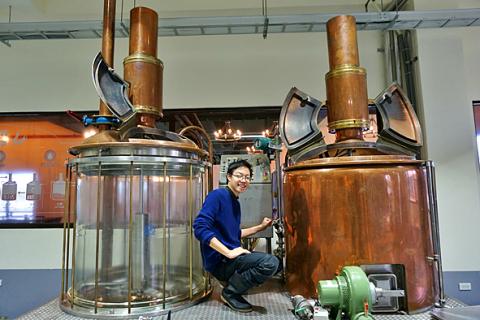
Photo: Dana Ter, Taipei Times
It wasn’t until after 2013 that craft brewing companies started to appear in earnest. This second wave was driven predominantly by expat home brewers, but also by young Taiwanese like Sung who had lived abroad.
Jim & Dad’s is arguably Taiwan’s only destination brewery. Strict laws confine breweries to industrial areas, and while Yuanshan Township is technically an industrial area, it is also blessed with abundant nature.
The location was important for Sung as he envisioned a brewery where people would come for day trips and family outings. Not to mention the name, Jim & Dad’s, which conjures up a warm, family vibe. Sung’s father, an engineer who previously worked in a factory for 30 years, was instrumental in setting up the brewery and helping Sung run it.
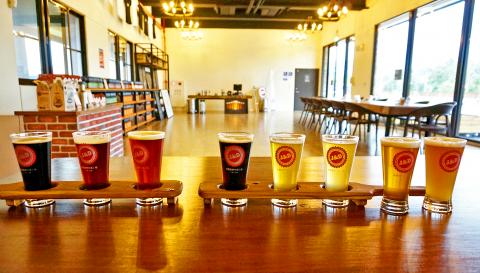
Photo: Dana Ter, Taipei Times
The other staff are Yilan natives mostly below the age of 30 (the oldest full-time employee is 31). It was a conscious decision as Sung wished to project an image of young, local people drinking top-quality craft beer.
He says that for too long, beer in Taiwan has been marketed as a cheap beverage that people drink from a can for the sole purpose of getting drunk. Sung hopes to change this mentality by using the brewery as a means of educating customers on the different varieties of craft beer, from light and fruity, to more roasted and bitter.
“It’s an opportunity to show people that beer is not supposed to be just bland, that there’s a wide variety of smells and flavors,” Sung says.
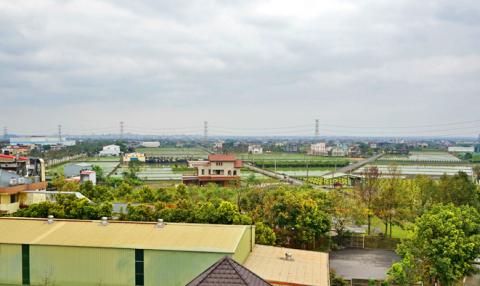
Photo: Dana Ter, Taipei Times
A lot of the ingredients, especially the fruits and spices, are sourced locally from farmers in Yilan. The wooden pedals used to serve flights are handmade by a local wood carver.
It is also Sung’s dream for Taiwan — and especially Yilan — to become intentionally recognized as a place that produces high-quality booze.
“I wanted to create a local establishment, but with an international outlook,” Sung says. “Taiwan does not market itself enough.”
‘BEER GEEK’
In the meantime, however, Sung is more concerned with practical details such as finishing the renovations at the brewery and perfecting the brews. He has plans to convert the second floor into a dining area where flat bread and smoked meat will be served and revamp the balcony area into a space for outdoor tasting and hosting private events. He’s also toying with the idea of giving home brewing lessons and growing his own hops — sourced from Nantou County — out by the entrance.
Sung shows me their brewing equipment, including the second-hand glass and copper tanks imported from Germany. The glass tank, which doubles as a mash tun and kettle, is built in such a way that the wort can be seen swishing around. The copper tank serves as a lauter tun and a whirlpool.
Once the hot wort is drained, it goes into one of the six fermentation tanks before being transferred to the bright beer tanks (rather than kegs) and then the packaging station. Since Jim & Dad’s makes mostly ales, the entire process from start to finish takes only around five weeks.
Sung, who considers himself a huge “beer geek,” says that it’s been fun experimenting with different hops and ingredients.
“Brewing is like cooking — it’s easy to cook, but it’s not easy to cook good food,” he adds.
CRAFT BEER BUZZ
The brewery has four regular beers on tap — the white ale, dark ale, pale ale and an India Pale Ale (IPA). The rest of the beers are seasonal. Sung considers the white ale and dark ale to be gateway beers, meaning that they were made intentionally light to cater to customers who aren’t used to more bitter flavors. He says that there’s still an aversion towards bitter beers amongst local consumers, and recommends that they try these two beers before moving on to the pale ale or IPA.
The white ale, which has only 4 percent alcohol, is, as its name suggests, extremely light. Brewed with raw wheat from Taiwan and some acid malt, it has a coriander seed aroma and goes down easy. The dark ale (5.1 percent), made with roasted malt and caramel malt, boasts a light coffee flavor, but without the bitterness. Sung eventually plans to turn the dark ale into a porter. For now, though, he refers to these two ales as “good afternoon beers.”
The pale ale (5.5 percent) is biscuity and fruity with bitter undertones, while the IPA (7 percent), brewed with Amarillo hops (the only dry hop used at the brewery), has a distinct lychee aroma. Like the pale ale, it’s also bitter and fruity at the same time, though slightly more towards the bitter end of the spectrum.
On tap this season is the kumquat ale (5 percent) made from kumquats grown on a nearby farm. Although kumquats grow in Yilan during the cooler months, the ale has a very discernable summery flavor — sweet and refreshing, with an acidic tang.
My favorite, however, is another seasonal brew, the ginger porter (7.1 percent). The ginger, which is sourced from another local farm, is thrown into the kettle at the end of the boil, giving it a toasty, smooth finish.
While Taiwan’s craft beer market is expanding, Sung believes that much still has to be done to change people’s perceptions.
“The buzz is growing really fast — there are a lot of people who are talking about craft beer, but not a lot who are actually drinking it,” Sung says.
He adds that he’ll get customers telling him that they’ve been to Germany, but when he asks what their favorite craft beer was, they’ll respond that they didn’t drink much. For Sung, it’s simply too much talking and not enough drinking.
“I don’t really like describing how the flavor of this beer or that beer tastes. I just sit at home and drink.”
Spoken like a true beer enthusiast.
Warning: Excessive consumption of alcohol can damage your health.
Drinking Taipei: Taipei is a city that has positioned itself as being cheap and fast, but the revolution for craft drinks is taking wind and alcohol aficionados are thirsty for more. Drinking Taipei is a monthly column devoted to spotlighting chic, conceptual bars that aren’t your typical watering hole.

Words of the Year are not just interesting, they are telling. They are language and attitude barometers that measure what a country sees as important. The trending vocabulary around AI last year reveals a stark divergence in what each society notices and responds to the technological shift. For the Anglosphere it’s fatigue. For China it’s ambition. For Taiwan, it’s pragmatic vigilance. In Taiwan’s annual “representative character” vote, “recall” (罷) took the top spot with over 15,000 votes, followed closely by “scam” (詐). While “recall” speaks to the island’s partisan deadlock — a year defined by legislative recall campaigns and a public exhausted

Hsu Pu-liao (許不了) never lived to see the premiere of his most successful film, The Clown and the Swan (小丑與天鵝, 1985). The movie, which starred Hsu, the “Taiwanese Charlie Chaplin,” outgrossed Jackie Chan’s Heart of Dragon (龍的心), earning NT$9.2 million at the local box office. Forty years after its premiere, the film has become the Taiwan Film and Audiovisual Institute’s (TFAI) 100th restoration. “It is the only one of Hsu’s films whose original negative survived,” says director Kevin Chu (朱延平), one of Taiwan’s most commercially successful

In the 2010s, the Communist Party of China (CCP) began cracking down on Christian churches. Media reports said at the time that various versions of Protestant Christianity were likely the fastest growing religions in the People’s Republic of China (PRC). The crackdown was part of a campaign that in turn was part of a larger movement to bring religion under party control. For the Protestant churches, “the government’s aim has been to force all churches into the state-controlled organization,” according to a 2023 article in Christianity Today. That piece was centered on Wang Yi (王怡), the fiery, charismatic pastor of the

The primaries for this year’s nine-in-one local elections in November began early in this election cycle, starting last autumn. The local press has been full of tales of intrigue, betrayal, infighting and drama going back to the summer of 2024. This is not widely covered in the English-language press, and the nine-in-one elections are not well understood. The nine-in-one elections refer to the nine levels of local governments that go to the ballot, from the neighborhood and village borough chief level on up to the city mayor and county commissioner level. The main focus is on the 22 special municipality